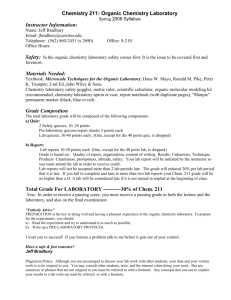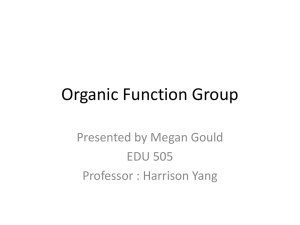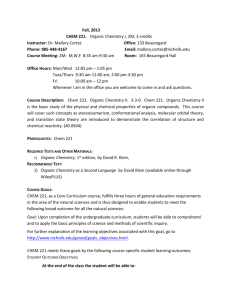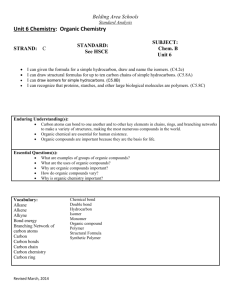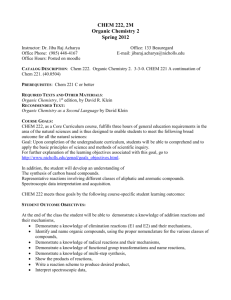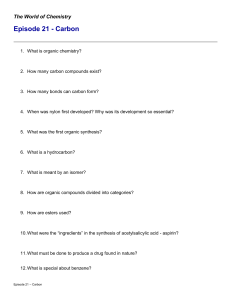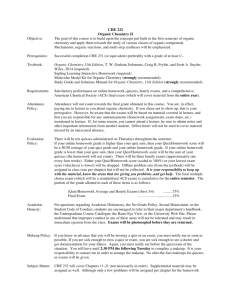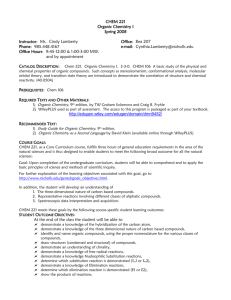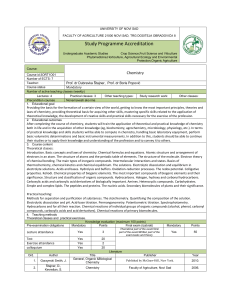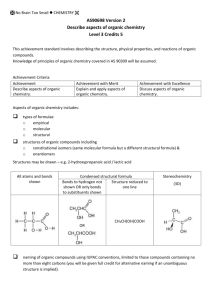rading: an overall score will be computed based upon the above
advertisement
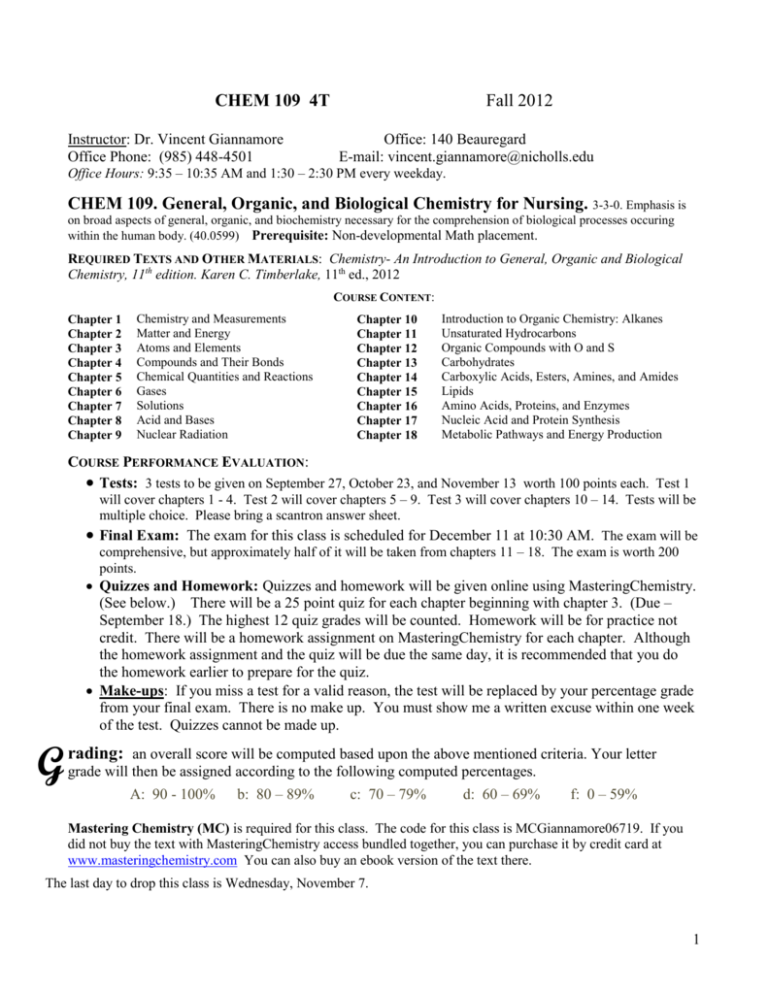
CHEM 109 4T Instructor: Dr. Vincent Giannamore Office Phone: (985) 448-4501 Fall 2012 Office: 140 Beauregard E-mail: vincent.giannamore@nicholls.edu Office Hours: 9:35 – 10:35 AM and 1:30 – 2:30 PM every weekday. CHEM 109. General, Organic, and Biological Chemistry for Nursing. 3-3-0. Emphasis is on broad aspects of general, organic, and biochemistry necessary for the comprehension of biological processes occuring within the human body. (40.0599) Prerequisite: Non-developmental Math placement. REQUIRED TEXTS AND OTHER MATERIALS: Chemistry- An Introduction to General, Organic and Biological Chemistry, 11th edition. Karen C. Timberlake, 11th ed., 2012 COURSE CONTENT: Chapter 1 Chapter 2 Chapter 3 Chapter 4 Chapter 5 Chapter 6 Chapter 7 Chapter 8 Chapter 9 Chemistry and Measurements Matter and Energy Atoms and Elements Compounds and Their Bonds Chemical Quantities and Reactions Gases Solutions Acid and Bases Nuclear Radiation Chapter 10 Chapter 11 Chapter 12 Chapter 13 Chapter 14 Chapter 15 Chapter 16 Chapter 17 Chapter 18 Introduction to Organic Chemistry: Alkanes Unsaturated Hydrocarbons Organic Compounds with O and S Carbohydrates Carboxylic Acids, Esters, Amines, and Amides Lipids Amino Acids, Proteins, and Enzymes Nucleic Acid and Protein Synthesis Metabolic Pathways and Energy Production COURSE PERFORMANCE EVALUATION: Tests: 3 tests to be given on September 27, October 23, and November 13 worth 100 points each. Test 1 will cover chapters 1 - 4. Test 2 will cover chapters 5 – 9. Test 3 will cover chapters 10 – 14. Tests will be multiple choice. Please bring a scantron answer sheet. Final Exam: The exam for this class is scheduled for December 11 at 10:30 AM. The exam will be comprehensive, but approximately half of it will be taken from chapters 11 – 18. The exam is worth 200 points. Quizzes and Homework: Quizzes and homework will be given online using MasteringChemistry. (See below.) There will be a 25 point quiz for each chapter beginning with chapter 3. (Due – September 18.) The highest 12 quiz grades will be counted. Homework will be for practice not credit. There will be a homework assignment on MasteringChemistry for each chapter. Although the homework assignment and the quiz will be due the same day, it is recommended that you do the homework earlier to prepare for the quiz. Make-ups: If you miss a test for a valid reason, the test will be replaced by your percentage grade from your final exam. There is no make up. You must show me a written excuse within one week of the test. Quizzes cannot be made up. G rading: an overall score will be computed based upon the above mentioned criteria. Your letter grade will then be assigned according to the following computed percentages. A: 90 - 100% b: 80 – 89% c: 70 – 79% d: 60 – 69% f: 0 – 59% Mastering Chemistry (MC) is required for this class. The code for this class is MCGiannamore06719. If you did not buy the text with MasteringChemistry access bundled together, you can purchase it by credit card at www.masteringchemistry.com You can also buy an ebook version of the text there. The last day to drop this class is Wednesday, November 7. 1 ACADEMIC HONESTY POLICY: Any student found cheating will be subject to the penalties as stated in the Student Code of Conduct handbook; including but not limited to a score of zero on exam, expulsion from the class or expulsion from the University. CLASS DISRUPTIONS: Are not tolerated. The use of cell phones, pager and/or any other electronic personal devise in class is prohibited. Any infractions can result in the dismissal and deregistration from class. ACADEMIC DISABILITIES POLICY: If you have a documented disability that requires assistance, you will need to register with the Office of Disability Services for coordination of your academic accommodations. The Office of Disability Services is located in Shaver Hall, Room 158A. The phone number is (985) 448-4430 (TDD 4497002). ACADEMIC GRIEVANCES: The proper procedure for filing grade appeals or grievances related to academic matters is listed in Section 5 of the Code of Student Conduct and at the following link: http://www.nicholls.edu/documents/student_life/code_of_conduct.pdf. COURSE GOALS Define Chemistry, matter, energy, material composition and identify substances as chemicals Know about metric system of measurements Learn about compounds, their formation, bonds and their reactivity towards other compounds Qualitative and quantitative interpretation of a chemical reaction Know about states of mater and their properties Understand various ways of defining acids and bases, pH, ionization, acid rain, buffers. Chemistry link to health. Familiarize with radiation and its application to the medical field Get introduced and will be able to identify organic compounds and their characteristics Will be able to understand biomolecules such as carbohydrates, classify them Understand proteins and its constituents Will have been presented with the intellectual tools to understand metabolic pathways CONTINUED LEARNING FOLLOWING AN EXTREME EMERGENCY: In order to make continued learning possible following an extreme emergency, students are responsible for: • reading regular emergency notifications on the NSU website; • knowing how to use and access Blackboard (or university designated electronic delivery system); • being familiar with emergency guidelines; • evacuating textbooks and other course materials; • knowing their Blackboard (or designated system) student login and password; • contacting faculty regarding their intentions for completing the course. Faculties are responsible for: • their development in the use of the Moodle (or designated) software; • having a plan for continuing their courses using only Blackboard and email; • continuing their course in whatever way suits the completion of the course best, and being creative in the continuation of these courses; • making adjustments or compensations to a student’s progress in special programs with labs, clinical sequences or the like only in the immediate semester following the emergency. Note: This is not a binding contract. This syllabus is subject to change throughout the course. Students will be notified of any changes 2
